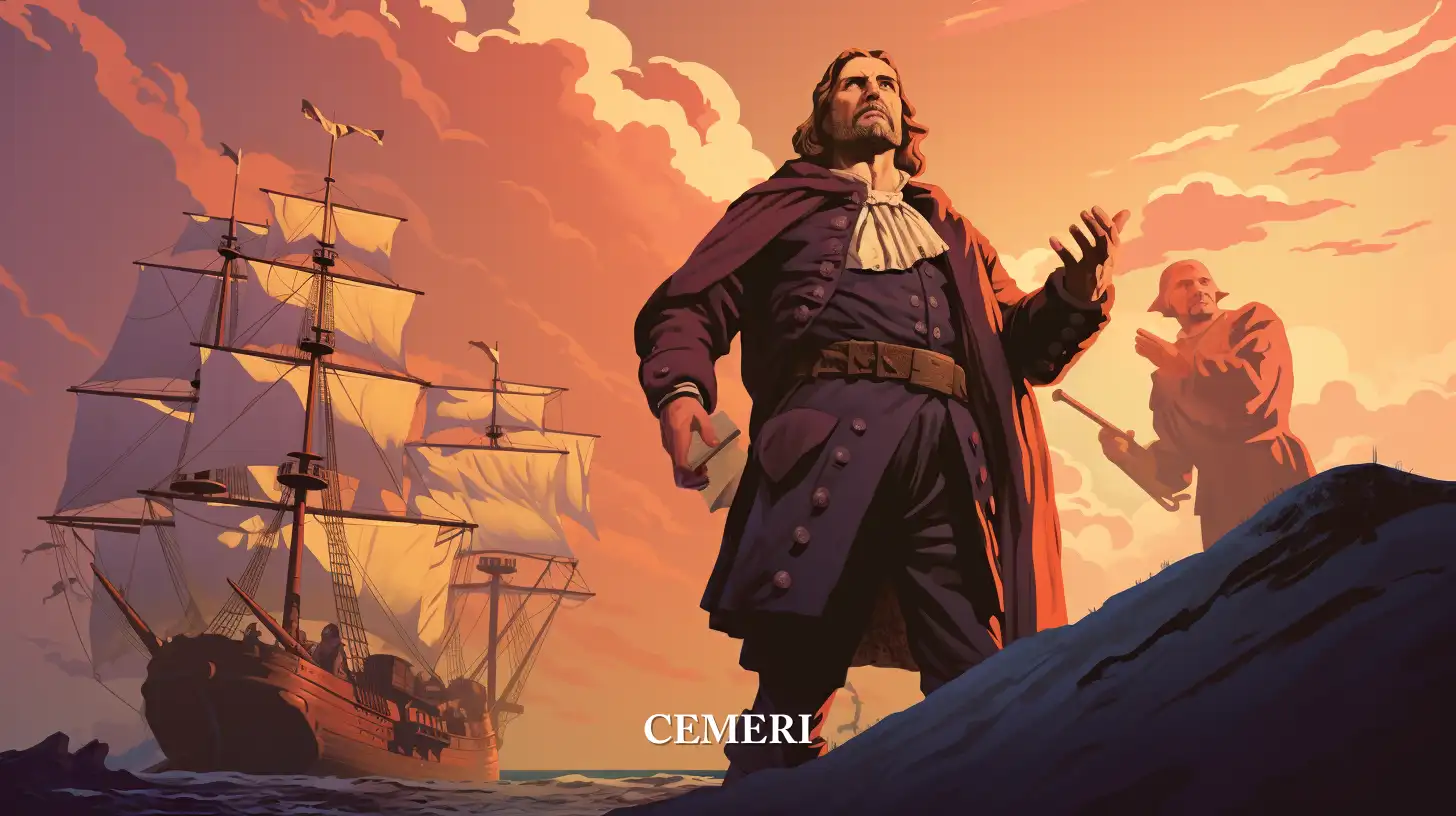Encyclopedia
CEMERI
The Discovery of America
- When we talk about the discovery of America we often think of Christopher Columbus and his landing in 1492.

When we talk about the discovery of America we often think of Christopher Columbus and his landing in 1492. However, the proven truth is that the first inhabitants of America arrived about 30,000 years ago, crossing the Bering Strait. There are also indications of Viking settlements, approximately 500 years before Columbus. But Columbus's endeavor was not limited to discovering new territory; it was a territorial and primarily religious expansion, seeking new trade routes to India.
Celebrated every October 12, Columbus Day is a relevant date, not so much because of Columbus as the discoverer, but because of the meeting of two cultures that until then did not know each other.
The expeditions of Christopher Columbus
The broad political, economic, social, and cultural transformation brought about by the arrival of European explorers in America has its starting point in the expeditions of Christopher Columbus. Columbus's first voyage began on May 22, 1492, in Palos de la Frontera, Huelva. With two caravels, the Pinta and the Santa Maria, and the three-masted nao with square sails, the city of the Indies, his goal was to find a new trade route in the Atlantic.
Expanding the view of Christopher Columbus's explorations, it can be said that the first signature on this horizon of immeasurable dimensions in America was the odyssey that began on May 22, 1492, from Palos de la Frontera, Huelva. Far from the rumor of the sea raised by the two caravels, the Pinta and the Santa Maria, without forgetting the three-masted nao that, clad in square sails, seemed to be a traveling shadow from Columbus's sailboat. In challenging the vast and enigmatic Atlantic, the goal of this expedition was to discover an innovative trade route, thus emerging as a driving force for the repertoire of transcendental journeys in history.
The influence of the scientific renaissance
Columbus's journey that would irreversibly change the course of history ended on October 12 of the same year with the first landing on the island of Guanahani, which Columbus named San Salvador. This feat was possible thanks to the earth's sphericity and advances in navigation, factors that defined the route and distance to be traveled.
The magnitude of the feat that Christopher Columbus would carry out marked the beginning of an irreversible change in human history. It ended with the first landing on the island he named San Salvador on October 12, 1492. A small, great detail of this odyssey lay in the correct understanding of the world as a sphere and the notable progress in the navigation techniques of the time. All of this allowed the route to be followed and the adequate distance for the expedition to be calculated precisely. One of the lesser-known but equally crucial facts was the scale made by the expedition in the Canary Islands before embarking on the assault on the vast ocean. In the end, these technological and scientific advances, along with Columbus's bold ambition and the support of the Catholic Monarchs, played a fundamental role in the success of the journey. Were it not for the confluence of these factors, the course of history could have been very different.
Consequences of the discovery of America
The arrival of Europeans in America brought with it a series of consequences in the social, economic, and cultural structure of the original inhabitants of the American lands. New navigation routes emerged, new sources of wealth, and products unknown to Europeans. However, it also led to the enslavement of the indigenous people, the spread of diseases, and the imposition of new customs and languages.
Without a doubt, the discovery of America is an unparalleled event in global history that drew a marked division between the old and the new world. This episode, although commonly attributed to Christopher Columbus and his landing in 1492, is in truth a complex web of facts, encounters, and mergers that shaped the contemporary configuration of the planet.
Columbus's expedition, aboard the ships Santa Maria, La Pinta, and La Nina, was not only seeking the exploration of new trade routes, but it unleashed a series of far-reaching consequences. From the subjugation and enslavement of indigenous populations and the imposition of new customs and languages, to the territorial, economic, social, and cultural expansion of the old world into the new one.
However, this discovery was also the door to new horizons, to the complete mapping of the globe, and to the intensive interrelation between all continents that still persists today. Therefore, celebrating this event goes beyond glorifying one figure and implies an acknowledgment of a decisive episode in the shaping of the world as we know it.
Criticism of the idea of the discovery of America
Precisely, the conception of the fact as a discovery has been the object of criticisms and questionings. Some argue that the word 'discovery' is incorrect in this context and have suggested using 'encounter' or 'conquest' instead, emphasizing that America was already inhabited by various cultures and civilizations.
The term 'discovery' has been criticized and questioned because of its implications. The choice of words such as 'encounter' or 'conquest' instead of 'discovery' may seem like a semantic subtlety, However, it is loaded with historical and cultural relevance. The voices promoting this perspective maintain that the term 'discovery' ignores the presence and the rich cultures of pre-existing civilizations in America.
These cultures included the advanced Aztec and Maya civilizations, among many others, who had long been inhabiting these lands well before the arrival of Christopher Columbus. By categorizing Columbus's arrival as a 'discovery,' thousands of years of history, cultural, scientific, and social development that was already taking place on the American lands could be eclipsed. That being said, the use of the term 'encounter' seeks to underline the cultural exchange that resulted and has undoubtedly played a role in the composition of the multicultural and diverse fabric of the Americas as we know them today. On the other hand, the choice of the word 'conquest' is no less controversial, as it connects to the period of colonization, subjugation, and exploitation experienced by the original peoples at the hands of the European explorers.
The importance of October 12: Columbus Day
Derived from these debates, every year Columbus Day is celebrated on October 12, a date that honors mestizaje and cultural diversity derived from the encounter between the indigenous peoples of America and the Europeans.
Emerging from these intellectual and cultural discussions, Columbus Day is celebrated every October 12, honoring the mestizo roots and cultural diversity that resulted from the encounter between the indigenous peoples of America and the Europeans. Even today, this celebration is observed across the American continent, redefining and challenging our understanding of history and underlining the rich fusion between the original peoples and European cultures. However, it is also crucial to recognize the shadows that this encounter cast on the indigenous peoples, subjected to colonization and exploitation policies.
The memory of this event, far from being a mere annual commemoration, remains a vital element in understanding not only America's past but also its present. Although Columbus's arrival marked the beginning of an era of drastic changes for the native civilizations, the survival and resistance of these peoples and their cultures over the centuries are a living testimony to their strength and resilience.
Sources
Descubrimiento de América. (n.d.). In Historia Universal, Enciclopedia Escolar Online. Retrieved from https://www.enciclopediaescolar.es/historia-universal/descubrimiento-de-america.html
Cristóbal Colón: exploraciones y descubrimientos. (n.d.). In Historia del Mundo, National Geographic. Retrieved from https://historia.nationalgeographic.com.es/a/cristobal-colon-exploraciones-descubrimientos_13816
El encuentro de dos mundos. (n.d.). In Instituto Nacional de Antropología e Historia (INAH). Retrieved from http://www.inah.gob.mx/es/boletines/90-el-encuentro-de-dos-mundos
Consecuencias del descubrimiento de América. (n.d.). In Biblioteca Digital Mundial. Retrieved from https://www.wdl.org/es/item/4285/
Día de la Raza. (n.d.). In Historia y Biografías. Retrieved from https://www.historiaybiografias.com/dia_de_la_raza/

